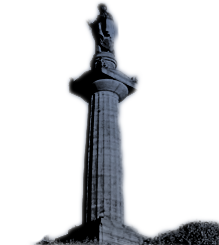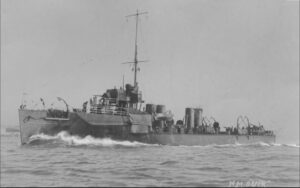Robert Stewart Laidlaw
| Rank | Lieutenant | |
| Medals | 1914 Star, British War Medal, Victory Medal | |
| regiment | Royal Navy | |
| Military Service | Joined the battleship HMS Agamemnon as a midshipman probably directly after leaving Dartmouth Naval College in May 1912. In February 1915 Agamemnon proceeded to the Mediterranean to take part in the bombardment of Turkish positions in support of the invasion of Gallipoli. Now a sub lieutenant, Robert left Agamemnon in April 1915 to joint HMS Ribble, a destroyer also serving in the Mediterranean. He spent almost a year aboard apart from a period in Bighi Hospital, Malta with suspected appendicitis. In May 1916 joined HMS Usk, a sister ship to Ribble in the same flotilla. He was starting to make progress in his career; he had passed his watch keeping certificate and was recommended for promotion to Acting Lieut and consideration for appointment as First Lieut of a destroyer. Towards the end of 1916 Robert must have returned to Britain as he underwent an operation for appendicitis at Haslar Hospital, Portsmouth on 23rd December 1916 and spent four weeks recuperating at South Queensferry. He was declared fit for active service in January 1917 and posted to HMS Mastiff at the end of the month. Mastiff was part of the 6th Destroyer Flotilla based at Dover. In May 1917 Mastiff ran ashore under Shakespeare Cliff, Dover, but she was refloated on the following day. A Court of Enquiry was called and Robert’s service record records he “is much to blame for gross carelessness”. On the other hand other evidence says the stranding was due to “great carelessness” on the part of Captain Hutchison the commanding officer. In June 1917 Robert moved to HMS Cardiff, flagship of 6th Light Cruiser Squadron and presumably was on board during the action in the Heligoland Bight on 17 November 1917. By this time Robert seems to have had a clearer picture of how his future career in the Royal Navy might develop as he applied for the Light Cruiser Gunnery Course at HMS Excellent, Portsmouth and left Cardiff at Rosyth on 10th November 1918. He completed the course at the end of January 1919 and was posted to HMAS Melbourne which was stationed in Britain at the time. In April 1919 Melbourne set off to return to Australia and Robert died on board her on 23 April 1919. | |
| Born | 25 December 1894 | |
| Death | 29th April 1919 | |
| Circumstances of Death | Died on board HMAS Melbourne from septicaemia while on passage from Singapore. | |
| Age | 24 | |
| Burial | Buried at sea | |
| CWGC Information | Son of Col. David Laidlaw and Annie Orr Stewart Laidlaw, of “Beechwood,” Skelmorlie, Ayrshire. Born at Glasgow. | |
| Parents | David Laidlaw & Annie Orr Stewart | |
| Father's Occupation | Engineer and Iron Founder | |
| Siblings | Yes | |
| Spouse | Became engaged to Mary Don Warren May 1918 | |
| Education | Royal Naval College, Osborne for 2 years followed by Royal Naval College, Dartmouth | |
| Home Address | Garnock House, Bridge of Allan | |
| Glasgow Necropolis | Compartment Epsilon Lair 650 | |
| Other Memorials | Plymouth Naval Memorial | |
| Other Information | In 1899 Master Robert Stewart Laidlaw (4 years old) presented the Countess of Eglinton with a bouquet of flowers after she opened a bazaar in the New Town Hall, Saltcoats in aid of funds for Ardeer U.P. Church | |
| Acknowledgements and Sources | Much of the information on which this profile is based is drawn from various internet sources which are listed below. The Friends of Glasgow Necropolis also wish to make full acknowledgement and thanks for the permitted use of any information or images generously supplied specifically for exhibition, publication or display in connection with The Roll of Honour and accompanying profiles to Ancestry, and Find my past. | |
Credits
Compiled by Morag Fyfe, Historical and Genealogical Researcher for The Friends of Glasgow Necropolis.










